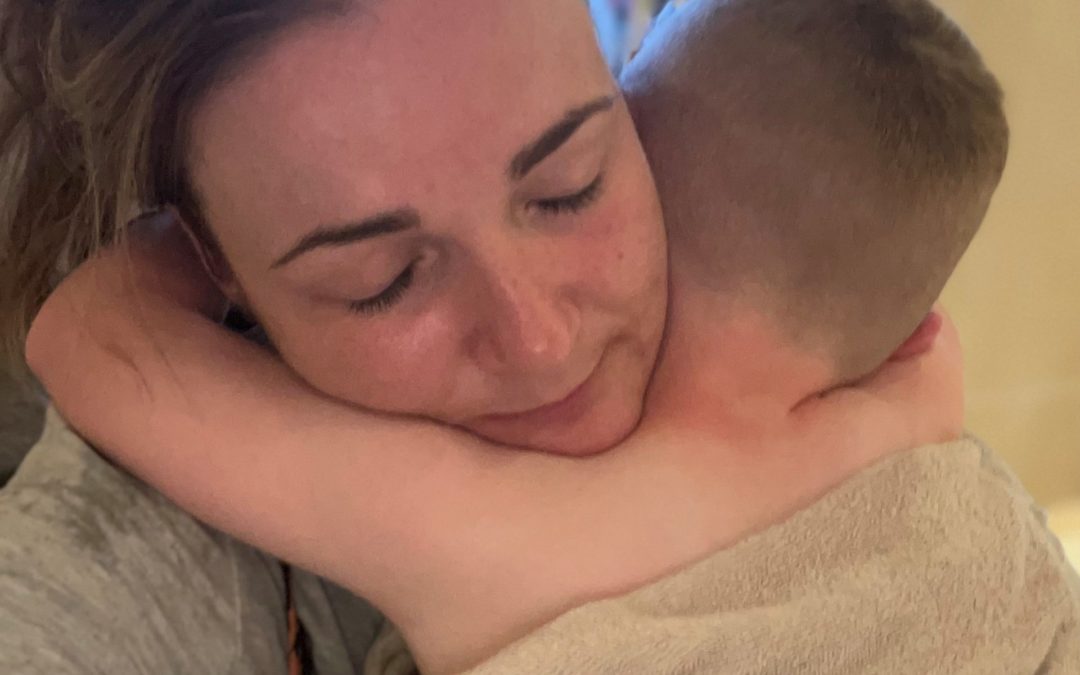This week (6 – 12 June) is Carers Week, a week to raise awareness of caring and highlighting the challenges carers face.
We asked our ambassador Rachel, who is a carer for her son with Hirschsprung’s Disease and a stoma, to share tips on how she navigates the world of being a carer. 💚
Being a Carer to my son is the greatest honour. When having him in 2016 and being told it was a 1 in 10 chance he would get Hirschsprung’s Disease, my gut told me he would be born with it. Mothers intuition was strong very soon into pregnancy. He was born presenting the classic symptoms of a distended tummy, struggling to feed and not able to get rid of any waste.
For this years Carers Awareness Week I thought I would share my tips on how I have navigated the world of being a Carer and what has helped me:
Connect with others
Being a Carer can feel very isolating, especially if the reason for the role isn’t something you have had experience with before. It is a huge culture shock if you had a job/career to then find yourself staying at home giving one individual all your attention. It can lead to losing contact with people in social situations you no longer find yourself in. This is why it is so important to try and make time to see people still and take help where it’s offered.
Check you have all the benefits you are entitled to
Having a career/job that you love, to then have to leave or change in order to fit into your new role as a carer can have a detrimental effect to a household’s finances. I wasn’t made aware that Carers Allowance existed for 18months after becoming a carer. It’s something I always mention to new people I meet in the same position. Back payment does not exist, and one thing you don’t need added to the stress of being a carer is worrying about money when it could be eased. In many attractions and facilities Carers count as a concession and can often get access to things at a discounted rate. Be sure to check before you go anyway so you know to ask. Don’t be ashamed or feel you are being cheeky, it’s there to help you.
Make time for you
It wasn’t until my little one started school that I realised I had been living in a very small bubble of medical life and had little existence out of it. You can easily loose yourself as you are consumed with looking after your loved one. I don’t have any regrets at all for what I have done, but being of school age has meant I can make a little more time for myself and find myself again. I practice self care much more, have my nails done, make plans with the girls and have found a healthy balance. At first I felt terribly guilty for going out for a meal or bingo for an evening, but soon realised it made me happier being good for my mental health making me a better Mum.
Keep a diary
I have always advised this in many blogs but still I think it important to include. When you have lots of appointments to attend, multiple practitioners involved, and procedures to go to it can be easy to forget everything you have been told. As a safeguard for the person you are caring for, keep note of what practitioners have said and advised may not seem needed, but if you needed to recall something, or heaven forbid something went wrong, you would be grateful you had it. Keep all the correspondence, and ask for email copies where possible so you have electronic copies in your inbox to save. I have all the practitioners names and numbers in my favourites on my phone and written down.
My final one is something I am yet to master myself but hope to do so soon: forgive yourself.
If like me the person you are caring for inherited their condition from yourself, the guilt that brings can be all consuming. During everyday life when hospital trips, surgeries and admissions occur the guilty can hit you like a tonne of bricks. For me it murmurs under the surface all the time, but during those times it is overwhelming. Family and friends tell me I can’t feel that way as I never meant for it to happen – 1 in 10 was the probability we were given, now to find out it was always 1 in 2 has made it harder to accept. My rational mind knows I shouldn’t carry this guilt but I do. I know many of us are in the same position. If it is too much, seek counselling or consolation in your support network. If private treatment is not possible the charity Mind can offer 6 weeks of support but does have a substantial waiting list. If you can’t look after yourself how can you look after others? Easily said than done I know. As for me, I’m still a work in progress!

